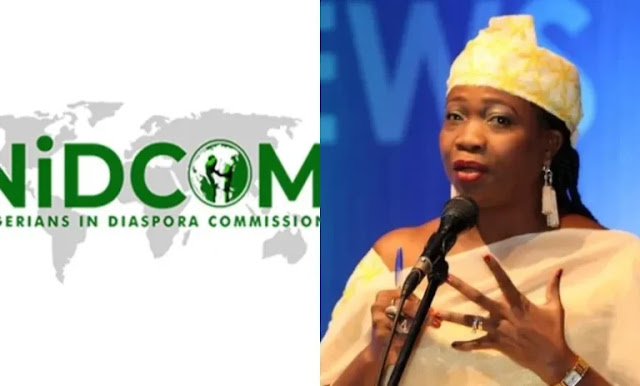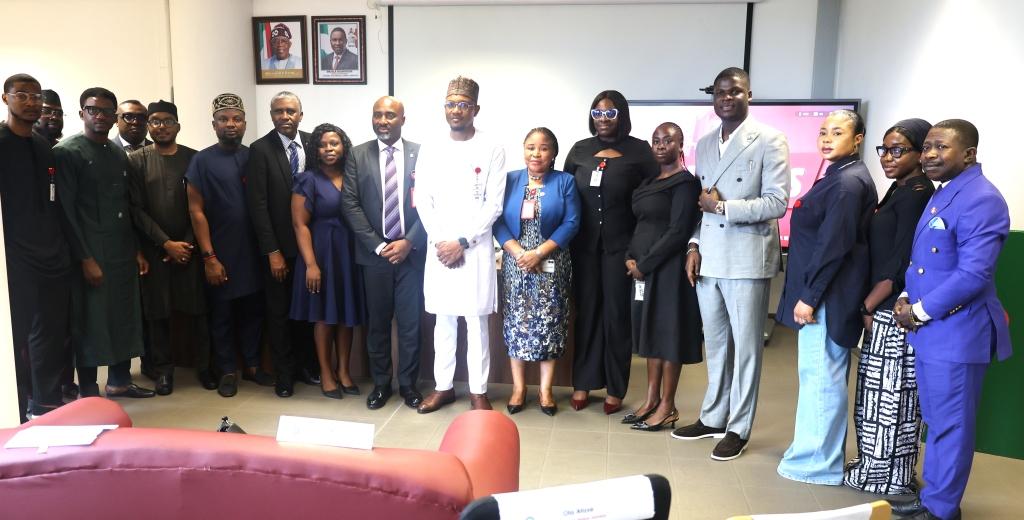In a stark warning to Nigerians seeking better opportunities abroad, the Nigerians in Diaspora Commission (NiDCOM) has described irregular migration as a “voluntary suicide mission” and a pathway to modern-day slavery. This powerful statement was made by NiDCOM’s Chairman and CEO, Hon. Abike Dabiri-Erewa, during a heartfelt reception in Abuja on September 3, 2025, for Mercy Oluwagbenga, a 24-year-old Nigerian woman who was recently rescued from Libya after enduring severe hardship. Oluwagbenga’s story, marked by exploitation, unpaid labor, and life-threatening conditions, serves as a chilling reminder of the perils of irregular migration. Her rescue, facilitated through collaborative efforts by NiDCOM, the Nigerian Community in Libya, and the Trinity Foundation, underscores the Nigerian government’s commitment to protecting its citizens abroad and curbing the dangerous trend of illegal migration.
This article delves into the complexities of irregular migration from Nigeria, exploring the socio-economic factors driving young Nigerians to undertake perilous journeys, the harrowing experiences they face, and the government’s efforts to address the crisis. It also examines the broader implications for Nigeria’s youth, economy, and diaspora engagement, offering a comprehensive analysis of a pressing issue that continues to claim lives and shatter dreams.
The Story of Mercy Oluwagbenga: A Cautionary Tale
Mercy Oluwagbenga’s journey is a poignant example of the dangers associated with irregular migration. A former business administration student at the University of Ilorin, Mercy dropped out in 2018 at the age of 20 due to financial difficulties. Lured by the promise of better opportunities abroad to support her ailing mother, she embarked on a treacherous journey to Libya in December 2021, traveling through illegal routes facilitated by human traffickers. What she encountered, however, was far from the promised land of opportunity.
In Libya, Mercy faced extreme hardship. She worked for one and a half years without receiving any payment, as she was obligated to repay an agent approximately ₦2.5 million for facilitating her journey. She endured maltreatment, including being locked in a house where her blood was drawn without her consent—an act that suggests potential involvement in illicit activities such as organ trafficking or medical exploitation. Mercy described her experience as being treated “like an animal,” a dehumanizing ordeal that left her physically and emotionally scarred. The loss of her mother, whom she had hoped to support, compounded her suffering, as she was unable to send even a small amount of money home.
Desperate and fearing for her life, Mercy made a viral distress video appealing for help. The video reached NiDCOM, prompting swift action from Dabiri-Erewa, who coordinated with the President of the Nigerian Community in Libya and Dr. Segun Abraham of the Trinity Foundation to secure her rescue. Mercy’s safe return to Nigeria, where she was received by Dabiri-Erewa in Abuja, marked a moment of relief and gratitude. However, as Dabiri-Erewa noted, Mercy was “one of the lucky ones,” as many others who attempt such journeys perish in the Sahara Desert, drown in the Mediterranean Sea, or remain trapped in exploitative situations.
Mercy’s story is not an isolated case. It reflects the experiences of thousands of Nigerians who, driven by economic hardship, unemployment, and the allure of a better life abroad, risk everything to migrate through irregular channels. Her ordeal has inspired her to join NiDCOM’s advocacy efforts to dissuade other young Nigerians from embarking on such dangerous journeys. “No matter the situation, don’t leave the country,” Mercy pleaded, emphasizing the importance of proper planning and legal migration pathways. Her commitment to raising awareness highlights the power of personal testimony in addressing this crisis.
The Scale of Nigeria’s Migration Crisis
The issue of irregular migration has reached alarming proportions in Nigeria, with over 7,000 Nigerians currently stranded in Libya alone, according to NiDCOM. These individuals, often young and desperate, undertake perilous journeys across the Sahara Desert or the Mediterranean Sea, hoping to reach Europe or other destinations perceived to offer better prospects. The International Organization for Migration (IOM) estimates that at least 30,000 undocumented Nigerians crossed the Mediterranean in a single year, with many losing their lives in the process. The majority of these migrants are fleeing economic hardship, unemployment, and insecurity, but their journeys often end in tragedy, exploitation, or forced repatriation.
Nigeria’s migration crisis is part of a broader regional challenge in sub-Saharan Africa, where economic instability, conflict, and climate-related displacement drive millions to seek opportunities elsewhere. In Nigeria, the single largest demographic of migrants stuck in transit countries like Libya is young people, many of whom are escaping poverty, unemployment, or violence from groups like Boko Haram. The IOM’s Assisted Voluntary Return and Reintegration program, in collaboration with the Nigerian government, has repatriated over 14,000 Nigerians from Libya since 2017, but the flow of migrants continues unabated.
The dangers of irregular migration are well-documented. Migrants face life-threatening risks, including dehydration and starvation in the desert, drowning at sea, and exploitation by traffickers who subject them to forced labor, sexual abuse, or organ trafficking. Those who survive these journeys often end up in detention centers in Libya, where conditions are notoriously inhumane. Human Rights Watch has noted that while voluntary return programs offer a lifeline, they are not truly voluntary when the only alternatives are indefinite detention or dangerous sea crossings.
Socio-Economic Drivers of Irregular Migration
To understand why young Nigerians like Mercy Oluwagbenga risk their lives through irregular migration, it is essential to examine the socio-economic factors driving this phenomenon. Nigeria, Africa’s most populous nation, faces significant challenges that push its youth to seek opportunities abroad:
Economic Hardship and Unemployment: Nigeria’s economy has struggled with high unemployment rates, particularly among young people. In 2020, the National Bureau of Statistics reported that 53.4% of youths were unemployed, a figure that has likely worsened due to ongoing economic challenges. Over 86 million Nigerians, or 41% of the population, live in extreme poverty, according to 2021 data from the World Poverty Clock. These economic realities, coupled with rising inflation and currency depreciation, create a sense of desperation among young people who see little hope for a better future at home.
The pressure to provide for immediate and extended families adds to this burden. In Nigeria, societal expectations place significant responsibilities on young adults to contribute to family and community welfare. Failure to meet these expectations often leads to social stigma, pushing individuals to take extreme measures, including irregular migration.
The “Imagined West” and Misinformation: The perception of Western countries as lands of opportunity plays a significant role in driving migration. An “imagined West,” shaped by media portrayals, social media, and stories from returnees, creates an idealized view of life abroad. Young Nigerians often believe that those who migrate enjoy better living standards, constant electricity, and safety—conditions that contrast sharply with Nigeria’s challenges. This perception is reinforced by informal sources, such as friends and relatives, who may exaggerate the benefits of migration while downplaying the risks.
Insecurity and Conflict: Insecurity, including insurgency by Boko Haram in the northeast, banditry in the northwest, and communal conflicts in other regions, has displaced millions of Nigerians. Over 3.6 million people are internally displaced, and many have fled to neighboring countries, creating a refugee crisis. For some, the decision to migrate irregularly is driven by a desire to escape violence and find safety abroad, even if it means risking their lives.
Education Disruptions: Nigeria’s public education system faces frequent disruptions due to strikes by academic staff, inadequate funding, and poor infrastructure. These challenges erode confidence in the system, prompting some young people to seek educational opportunities abroad. In some cases, traffickers exploit this desire by promising uninterrupted education in foreign countries, only to trap victims in exploitative situations.
Climate-Related Displacement: Sub-Saharan Africa, including Nigeria, is predicted to see significant climate-related displacement due to droughts, floods, and other environmental hazards. In Nigeria, devastating floods have displaced hundreds of thousands, particularly in agricultural regions, exacerbating economic hardship and pushing more people to consider migration as a survival strategy.
The Dangers of Irregular Migration: A Pathway to Modern Slavery
The journey through irregular migration routes is fraught with danger. Migrants often travel through the Sahara Desert, where they face extreme heat, dehydration, and abandonment by smugglers. Those who survive the desert may attempt to cross the Mediterranean Sea in overcrowded, unseaworthy boats, risking drowning. The IOM reports that at least 521 Africans, many of them Nigerians, drowned in the Mediterranean in a single year.
In transit countries like Libya, migrants face exploitation by traffickers and employers. Many are subjected to forced labor, sexual abuse, or detention in overcrowded camps with limited access to food, water, or medical care. Mercy Oluwagbenga’s experience of working without pay and having her blood drawn without consent highlights the extreme forms of exploitation that migrants endure. Some are sold into slavery, while others face organ trafficking or other forms of violence.
Returnees who are repatriated to Nigeria often face significant challenges reintegrating into society. Many suffer from physical and mental health issues, including post-traumatic stress disorder, and face social stigma as “failed migrants.” The lack of adequate reintegration programs exacerbates these challenges, leaving returnees vulnerable to poverty and further exploitation.
Government Efforts to Combat Irregular Migration
The Nigerian government, through NiDCOM and other agencies, has taken steps to address the migration crisis and protect its citizens abroad. NiDCOM, established in 2019, plays a central role in coordinating diaspora affairs and advocating for safe, legal migration. The commission has been instrumental in rescuing stranded Nigerians, as evidenced by Mercy Oluwagbenga’s case, and works with international partners like the IOM and UNHCR to facilitate voluntary returns.
Key government initiatives include:
Advocacy and Awareness Campaigns: NiDCOM has intensified efforts to educate Nigerians about the dangers of irregular migration. Through public campaigns, media engagements, and partnerships with community leaders, the commission aims to dispel myths about life abroad and promote legal migration pathways. Mercy Oluwagbenga’s pledge to join these advocacy efforts highlights the potential of survivor testimonies in deterring others from taking similar risks.
Rescue and Repatriation: NiDCOM collaborates with Nigerian communities abroad, NGOs, and international organizations to rescue stranded migrants. The commission’s swift response to Mercy’s distress call demonstrates its commitment to protecting Nigerians in crisis. Since 2017, over 14,000 Nigerians have been repatriated from Libya through the IOM’s voluntary return program, with support from the Nigerian government.
Reintegration Support: Recognizing the challenges faced by returnees, NiDCOM and its partners are working to provide rehabilitation and reintegration support. In Mercy’s case, Dabiri-Erewa assured that the commission would assist her in accessing the Nigerian Education Loan Fund (NELFUND) to resume her education, which she abandoned in 2018. In Edo State, a major hub for returnees, the government has established a support program that provides temporary accommodation, psychological counseling, and financial assistance to help returnees rebuild their lives.
Policy Reforms: The government is advocating for effective labor migration governance to ensure the rights and dignity of migrant workers. At a recent workshop on the Trade Union Migration Forum, Dabiri-Erewa emphasized the importance of leveraging diaspora experiences to shape migration policies and strengthen regional cooperation through ECOWAS. The National Agency for the Prohibition of Trafficking in Persons (NAPTIP), established under the 2003 Trafficking in Persons Law, also plays a critical role in combating human trafficking and supporting victims.
Educational Opportunities: The introduction of NELFUND, commended by Dabiri-Erewa, aims to provide financial support to students like Mercy, reducing the likelihood of dropping out due to financial constraints. By addressing the root causes of migration, such as lack of access to education, the government hopes to create viable opportunities at home.
The Role of Traditional Leaders and Community Engagement
Traditional rulers have emerged as key stakeholders in the fight against irregular migration. The Oba of Benin, for instance, led a successful campaign against human trafficking in Edo State, a major epicenter of the sex trafficking trade. The ongoing review of Nigeria’s 1999 Constitution, which proposes a greater role for traditional rulers in governance, could further enhance their ability to dissuade youth from dangerous migration. Community-based awareness campaigns, led by trusted leaders, are critical to addressing the cultural and social pressures that drive migration.
International and Regional Cooperation
Nigeria’s efforts to combat irregular migration are supported by international and regional partners. The IOM and UNHCR work closely with the government to provide humanitarian assistance, facilitate returns, and address the root causes of migration. The African Union’s focus on regional integration, including visa-free travel and the AfCFTA, aims to create opportunities for intra-African migration, reducing the need for dangerous journeys to Europe. However, challenges such as limited visa access and weak enforcement of migration policies continue to hinder progress.
Broader Implications for Nigeria’s Youth and Economy
The migration crisis has profound implications for Nigeria’s youth, who represent the country’s future. The loss of young lives in the desert or at sea, coupled with the exploitation of those who survive, represents a tragic waste of human capital. The “brain drain” caused by migration also deprives Nigeria of talent needed for economic development. Addressing the root causes of migration—unemployment, poverty, and insecurity—is essential to harnessing the potential of Nigeria’s youthful population.
Economically, the cost of irregular migration is significant. Families often incur heavy debts to finance these journeys, only to face further hardship when migrants are repatriated or lost. The government’s investment in rescue and reintegration programs, while necessary, diverts resources from other critical areas such as education and healthcare. By creating opportunities at home, Nigeria can reduce the economic and social toll of migration.
Policy Recommendations for Addressing Irregular Migration
To address the migration crisis and prevent further loss of life, the Nigerian government and its partners should consider the following recommendations:
Strengthen Economic Opportunities: Addressing unemployment and poverty is critical to reducing the desperation that drives irregular migration. Investments in job creation, vocational training, and entrepreneurship programs can provide viable alternatives for young Nigerians. The government should prioritize sectors such as agriculture, technology, and manufacturing, which have high potential for job creation.
Enhance Education Access: Expanding access to affordable education through initiatives like NELFUND can prevent dropouts and provide young people with the skills needed for employment. Reforming the public education system to address disruptions and improve quality is also essential.
Intensify Awareness Campaigns: Public education campaigns, leveraging media, schools, and community leaders, should focus on the dangers of irregular migration and the benefits of legal pathways. Survivor stories, like Mercy’s, can be powerful tools for deterrence.
Strengthen Anti-Trafficking Measures: NAPTIP and other agencies should enhance efforts to dismantle trafficking networks, prosecute offenders, and protect victims. International cooperation is needed to address cross-border trafficking and ensure the safety of migrants in transit countries.
Improve Reintegration Programs: Returnees need comprehensive support to reintegrate into society, including access to mental health services, vocational training, and financial assistance. Scaling up programs like those in Edo State can help returnees rebuild their lives and contribute to their communities.
Address Insecurity and Climate Challenges: Tackling insecurity and climate-related displacement requires coordinated efforts to improve security, support displaced communities, and invest in climate adaptation strategies. This will reduce the push factors driving migration.
Conclusion: A Call to Action for Nigeria’s Future
The 40.5% surge in non-oil revenues to ₦20.59 trillion in 2024, as reported by the Budget Office, highlights Nigeria’s potential to build a diversified and resilient economy. While this economic milestone is unrelated to the migration crisis, it underscores the importance of creating opportunities at home to reduce the desperation that drives young Nigerians to risk their lives abroad. Mercy Oluwagbenga’s story, and the thousands like it, serves as a sobering reminder of the human cost of irregular migration.
NiDCOM’s warning that irregular migration is “voluntary suicide” is a call to action for all stakeholders—government, civil society, traditional leaders, and the international community—to address the root causes of this crisis. By investing in education, job creation, and security, Nigeria can provide its youth with viable alternatives to dangerous migration. Mercy’s safe return and her commitment to advocacy offer hope that, with concerted effort, Nigeria can stem the tide of irregular migration and build a brighter future for its citizens.
The journey to curb irregular migration is complex and multifaceted, but it is not insurmountable. With sustained commitment, Nigeria can protect its citizens, harness the potential of its youth, and create a nation where dreams are pursued safely and legally within its borders.






